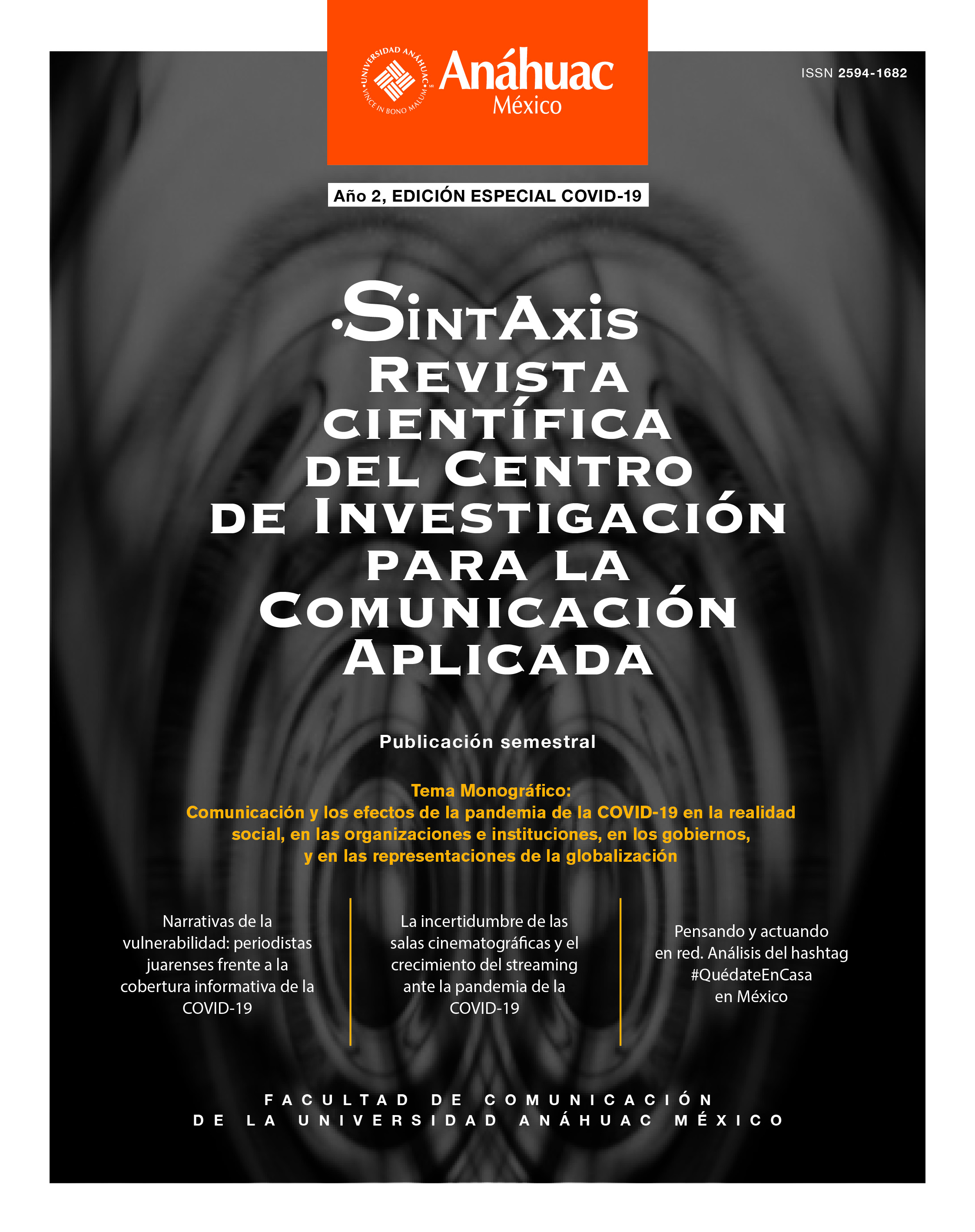Fake news, disinformation and infodemy during the COVID-19 pandemic
Main Article Content
Abstract
The maturity of Informaction and Comnunication Technolgies (ITC) has triggered an exponential growth of information in all areas of knowledge and during the pandemic the topic of coronavirus has increased, especially. This work was developed using documentary research with character descriptive, with a qualitative and interpretive methodology, the objective is to analyze how information on the COVID-19 pandemic has been disseminated, giving way to the so called infodemic, how fake news has been disseminated through social networks, and what have been the strategies implemented by different authorities and Internet sites. As a result of the analysis it was determined, the need for a Digital Literacy of the society so that it can identify the information that is trustworthy and safe, and discard the false news.
Downloads
PLUMX Metrics
Article Details
The author keeps the property rights with no restriction whatsoever and guarantees the magazine the right to be the first publication of the work. The author is free to deposit the published version in any other medium, such as an institutional archive or on his own website.
References
Blake, A. (2018, 3 de abril). A new study suggests fake news might have won Donald Trump the 2016 election. The Washington Post. https://www.washingtonpost.com/news/the-fix/wp/2018/04/03/a-new-study-suggests fake-news-might-have-won-donaldtrump-the-2016-election/?noredirect=on&utm_term=.63e586c71ef8
Chávez, G. (2020, 26 de mayo). Whatsapp y otros chatbots conta las noticias falsas y el COVID-19. Expansión. https://expansion.mx/tecnologia/2020/05/26/whatsapp-yotros- chatbots-contra-las-noticias-falsas-y-el-covid19
Darnton, R. (2017, 13 de febrero). The True History of Fake News. NYR Daily (blog), New York Review of Books. http://www.nybooks.com/daily/2017/02/13/the-true-historyof- fake-news/
Elósegui, L. (2017, 28 de octubre). Siete sitios para detectar noticias falsas. Verificado. https://verificado.com.mx/7sitios-detectar-noticias-falsas/
Equipar. (2020). Noticias falsas sobre el COVID 19 invaden las redes sociales. https:// www.revistaequipar.com/noticias/noticias-falsas-sobre-el-covid-19
las notici as falsas (fake news), la desinfo rmaci ón y la infod emia durante la pandemia 201 Estrada-Cuzcano, A., Alfaro-Mendives, K., & Saavedra-Vásquez, V. (2020, junio). Desinformation y misinformation posverdad y fake news: precisiones conceptuales, diferencias, similitudes y yuxtaposiciones. Información, cultura y Sociedad, 42. https://doi.org/10.34096/ics.i42.7427 Expansión Política. (2020, 10 de abril). Agresiones a personal médico van en aumento en medio de la epidemia del COVID-19. https://politica.expansion.mx/mexico/ 2020/04/10/agresiones-a-personal-medico-van-en-aumento-en-medio-de-la-epidemia-
de-covid-19
Expansión Tecnología (2020, 12 de mayo). Twitter etiqueta fake news sobre COVID-19 https://expansion.mx/tecnologia/2020/05/12/twitter-etiquetara-fake-news-sobre-covid- 19?utm_source=internal&utm_medium=branded
Galdón, G. (2001) “Información, desinformación y manipulación”. En Galdón, G. (coord.).Introducción a la comunicación y a la información (pp. 47-75). Ariel.
Ghebreyesus, T. A., & Ng, A. (2020, 18 de febrero). Desinformación frente a medicina:hagamos frente a la infodemia. El País. https://elpais.com/sociedad/2020/02/18/actualidad/1582053544_191 857.html
International Federation Library Association (IFLA). (2017). Cómo las bibliotecas puedenayudar a conseguir soluciones reales para las noticias falsas. https://www.ifla.org/ES/node/11631
Infobae. (2020, 4 de abril). Qué es a infodemia y cómo influye para promover la discriminación en media de la pandemia de coronavirus. https://www.infobae.com/america/
mexico/2020/04/04/que-es-la-infodemia-y-como-influye-para-promover-la-discriminacion-en-medio-de-la-pandemia-de-coronavirus/
Infobae. (2020, 7 de mayo). Tres noticias falsas sobre el coronavirus que recorren la red. https://www.infobae.com/america/mexico/2020/05/07/tres-noticias-falsas-sobreel-coronavirus-que-recorren-la-red/
Infobae. (2020, 5 de julio). Tres noticias falsas sobre el coronavirus que recorren la red.https://www.infobae.com/america/mexico/2020/05/07/tres-noticias-falsas-sobreel-coronavirus-que-recorren-la-red/
Miller, C. (2018, 12 de noviembre). Fake news: así funciona la industria de las noticiasfalsas con la que algunos jóvenes se ganan la vida en Europa del Este. BBC News.https://www.bbc.com/mundo/noticias-46163407
OPS (2020, 1 de mayo). Entender la infodemia y la desinformación en la lucha contra la COVID-19. https://www.paho.org/es/documentos/entender-infodemia-desinformacionlucha- contra-covid-19
Pacheco, M. (2020, 6 de mayo). ¡Cuidado! Las falsas noticias, son tan peligrosas comoel mismo Covid -19. Forbes. https://forbescentroamerica.com/2020/05/06/cuidado-as-falsas-noticias-son-tan-peligrosas-como-elmismo-covid-19
Pané, G. H. (2020). Grandes pandemias de la historia. National Geographic, Historia. https://historia.nationalgeographic.com.es/a/grandes-pandemias-historia_15178/5
Plottier, J. L. (2015). Teoría de redes y fenómenos de comunicación: problemas metodológicos. Dixit (21), 56-67. https://doi.org/10.22235/d.v0i21.400
Prnoticias (2020, 23 de marzo). La pandemia virtual: las redes sociales en el impactomediático del coronavirus. Prnoticias.com. https://prnoticias.com/2020/03/23/redes-sociales-en-el-impacto-mediatico/
Purdy, G.W. (2015, Oct-nov). A review of The Art of Political Lying by Jonathan Swift. Reviews & Interviews. http://www.eclectica.org/v19n4/purdy_swift.html
Rizo, M. (2006). La interacción y la comunicación desde los enfoques de la psicología social y la sociología fenomenológica: breve exploración teórica. Analisi Quaderns de comunicacio i cultura. https://dialnet.unirioja.es/servlet/articulo?codigo=2136324
Rizo, M. (2007). Interacción y comunicación en entornos educativos: Reflexiones teóricas, conceptuales y metodológicas. E-Compós, 8. https:/doi.org/10.30962/ec.143
Rodriguez, R. (2018). Fundamentos del concepto de desinformación como práctica manipuladora en la comunicación política y las relaciones internacionales. Historia yComunicación Social. https://doi.org/10.5209/HICS.59843
Statista. (2020). Ranking de las principales redes sociales a nivel mundial según el número de usuarios mensuales activos en enero de 2020. https://es.statista.com/estadisticas/600712/ranking-mundial-de-redes-socialespor-numero-de-usuarios/
Tufte, T. (2017). Communication and social change: A citizen perspective. https://ebookcentral.proquest.com
Villalobos, J. (2020, 26 de junio). 6 pasos para leer notas de Covid -19 con ojo crítico (opinión experta). Tecnológico de Monterrey, Guadalajara. https://tec.mx/es/noticias/guadalajara/salud/6-pasos-para-leer-notas-decovid-19-con-ojo-critico-opinionexperta
Wordpress. (2008, 28 de junio). Alfabetización digital. APA Style Blog. https://literaciapr.wordpress.com/2008/06/28/definicion-de-alfabetizacion-digital

